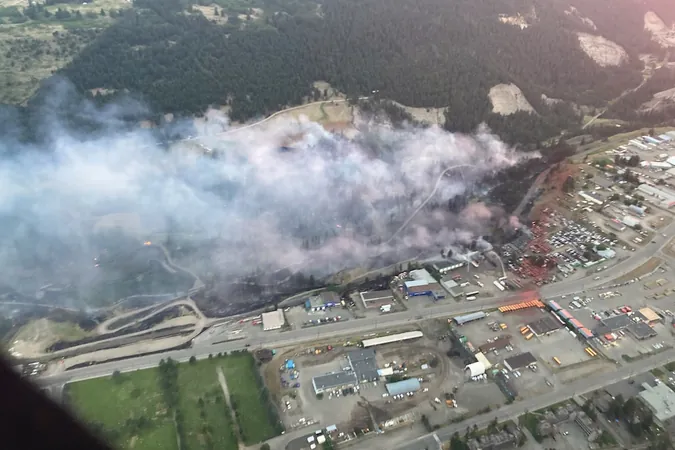
Alarming New Research Links Wildfire Smoke to Increased Dementia Risk Among Seniors
2024-11-27
Author: Benjamin
A new study has revealed shocking insights about the long-term health effects of wildfire smoke, particularly for older adults. Conducted by researchers at the University of Washington, the research indicates that the hazardous ultrafine particles found in wildfire smoke significantly elevate the risk of dementia in individuals aged 60 and above.
According to lead author Joan Casey, an environmental epidemiologist, the findings underscore an urgent public health issue aggravated by climate change—a shift expected to intensify wildfire frequencies and severity. “As our climate continues to warm, the risk of exposure to wildfire smoke will only become more pronounced,” Casey stated, shedding light on the precarious situation that vulnerable populations face.
The study identified a staggering 18% increase in the risk of dementia diagnosis for those over 60 who are exposed to heightened levels of particulate matter from wildfire smoke. This includes both prolonged exposure during extended wildfire seasons and acute exposure on days characterized by significantly poor air quality.
Notably, Casey pointed out that wildfire smoke contains harmful pollutants and fine particulate matter designated as PM2.5, which can infiltrate the human body through the respiratory system and travel to the brain. With particle sizes often measured at 25 times smaller than PM2.5, these microscopic entities pose significant threats to cognitive function, elevating the risk of dementia—a debilitating condition currently affecting approximately 10% of individuals over 65. With limited effective treatments available for dementia and related diseases such as Alzheimer’s, the implications of this research are dire.
This alarming trend impacts a diverse segment of the population, particularly those who may lack access to real-time air quality warnings, adequate filtration systems, or the means to limit their outdoor activities during fire season. Casey emphasized that marginalized communities, often the hardest hit by climate change, are thus disproportionately affected.
In collaboration with experts from leading institutions, including the University of Pennsylvania and Columbia University, the researchers analyzed comprehensive medical records spanning over a decade, focusing on more than 1.2 million Southern Californians aged 60 and older. The study’s timeline, stretching from 2008 to 2019, notably excludes the record-setting fire seasons of 2020 and 2021, which might further exacerbate concerns about health risks.
Compounding the dangers of wildfire smoke, researchers noted that these pollutants can also lead to respiratory and cardiovascular health problems—especially for individuals with preexisting conditions. The chaotic effects of wildfire smoke extend beyond typical regions affected, as evidenced earlier this year when Canadian wildfires cast a haze across vast areas of the eastern United States, even reaching major urban centers like New York City.
Casey cautioned that while the study reinforces the growing understanding of the health impacts of wildfire smoke, more extensive research is essential. “It’s crucial that we expand our studies to various populations and geographical regions to fully grasp the breadth of this public health issue,” she stated, recognizing that the challenges posed by wildfire smoke are not confined to specific locations.
As we move forward in an era of increased wildfires, taking proactive measures to safeguard public health is critical. Casey advises vulnerable groups to mitigate their exposure by seeking refuge indoors, utilizing air filtration systems, and wearing masks when necessary.
“Wildfire smoke is no longer an anomaly; it represents a systemic health challenge affecting all Americans,” Casey concluded, highlighting the urgent need for increased awareness and action in addressing climate-related health hazards.









 Brasil (PT)
Brasil (PT)
 Canada (EN)
Canada (EN)
 Chile (ES)
Chile (ES)
 España (ES)
España (ES)
 France (FR)
France (FR)
 Hong Kong (EN)
Hong Kong (EN)
 Italia (IT)
Italia (IT)
 日本 (JA)
日本 (JA)
 Magyarország (HU)
Magyarország (HU)
 Norge (NO)
Norge (NO)
 Polska (PL)
Polska (PL)
 Schweiz (DE)
Schweiz (DE)
 Singapore (EN)
Singapore (EN)
 Sverige (SV)
Sverige (SV)
 Suomi (FI)
Suomi (FI)
 Türkiye (TR)
Türkiye (TR)